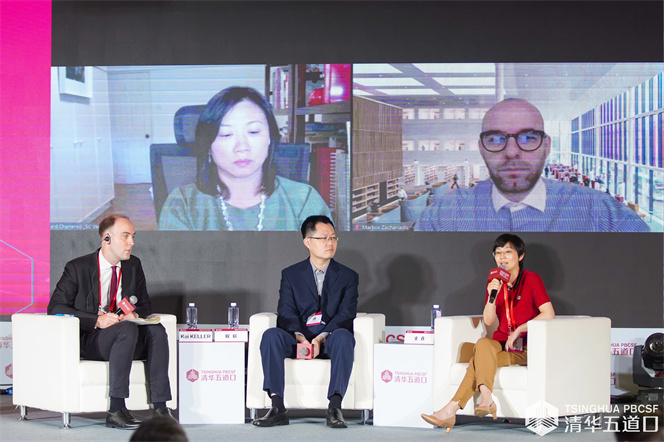2021 Tsinghua PBCSF Global Finance Forum
Plenary Session IV: Digital Economics Boosting Global Economic Recovery
With the accelerated development of global digitalization and informatization, the digital economy has increasingly become a new engine for economic recovery and economic growth. The Plenary Session IV of the Tsinghua PBCSF Global Finance Forum focused on "Digital Economics Boosting Global Economic Recovery", and invited guests to share management experience and opinion on this topic. Kai Keller, the Initiative Lead from The Future of Financial Services in China, World Economic Forum Beijing Representative Office, hosted this meeting.
Kai Keller mentioned that the development of digital economy has greatly reduced the transaction costs of the traditional economy and expanded economic activities to a global scale, helping to reduce transaction barriers and frictions. The digital economy has effectively improved information productivity, reduced information acquisition costs, learning costs, and new technology dissemination costs, thereby increasing the world economy’s production capacity.
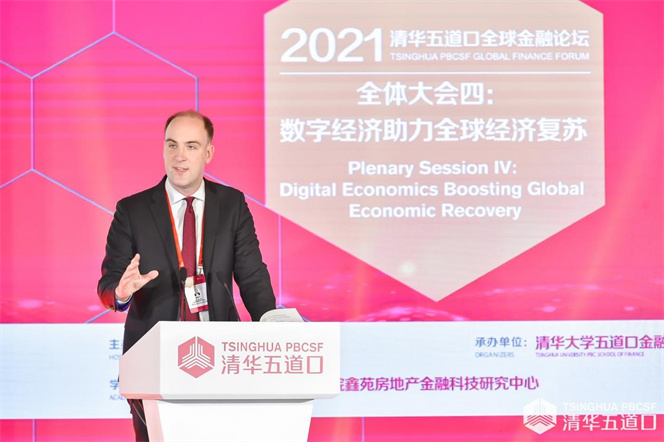
Figure. Kai Keller
Alice Law Shing Muim, the Deputy Chairman and Managing Director from Hong Kong Mandatory Provident Fund Authority delivered a keynote speech. She pointed out that the digital economy has played an important role in the past year and has developed rapidly. The scale of the digital economy development is unbalanced globally. The digital economy accounts for more than half of the GDP of developed countries, but only 1/4 of GDP in developing countries. The Pandemic has changed the way that social economy operates, whether it is logistics or energy supply. Using the professional language of supervision, each country and region, whether it is large or small, has been put into a huge stress test at the same time. Small and medium-sized enterprises have suffered the most, because of the sudden emergence of the Pandemic and the implementation of social distancing, retail customers cannot receive retail services. Some financial services, payment services, and insurance premium payment have also encountered challenges. Small and medium-sized enterprises are the backbone of the economy, so the potential digital divide will not only weaken their competitiveness and development, but also severely damage the vitality of the economy.
The digital economy can help a healthier global economic recovery. The government can strengthen the economy to help the global economic recovery, so that everyone can benefit. The government and the central bank must also rely on the innovations from these financial technology companies to build a better social framework, make the real economy more resilient, and can withstand the crisis may be greater than what we currently have experienced. With infrastructure and safeguards, digital transformation will be more assured. But every enterprise and individual must be included in the digital transformation process. Governments of all country play an important role to establish an appropriate inclusive structure. Small and medium-sized enterprises and disadvantaged groups must be promoted.
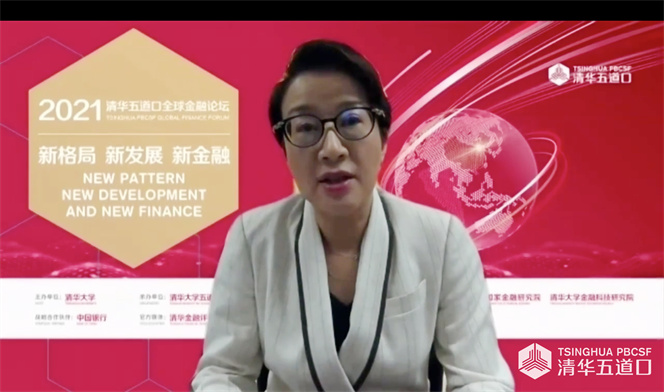
Figure. Alice Law Shing Muim
Xiaoyan Zhang, Xinyuan Professor of Finance and Associate Dean, Tsinghua PBCSF; Deputy Chair, THUIFR, delivered a speech titled "Building a Digital Economy Ecosystem to Lead the New Growth of the National Economy".
Professor Xiaoyan Zhang introduced the development status of global and China's digital economy, she then took an example from Dazu District of Chongqing, China to introduce the digital economy ecosystem that government lead and joint participation of government, business and residents. From the government perspective, the government can create a healthy and orderly operating environment for the digital economy and provide effective external supervision of the digital economy by accelerating the construction of digital economy infrastructure. Government still faces challenges in the digital economy construction: data exchange and sharing mechanisms between various departments and industries are unsound; information leakage, data abuse, and technical security issues emerge one after another; the development of the digital economy is uneven. From the enterprise perspective, the enterprises empower industrial development and promote production and operation efficiency through the digital economy. Enterprises, especially financial technology companies, can provide technical support, quality services and safety guarantees for the digital economy. From the household perspective, residents can promote personal development, improve the quality of life through participation in the digital economy.
Professor Zhang Xiaoyan believes that in the creation of the future digital economy ecosystem, the government should innovate digital service models and improve infrastructure construction; the enterprises should actively develop new digital economy business models, and promote digital transformation; the residents can enjoy the dividends brought by the development of digital economy and cultivate digital literacy and improve the quality of life.
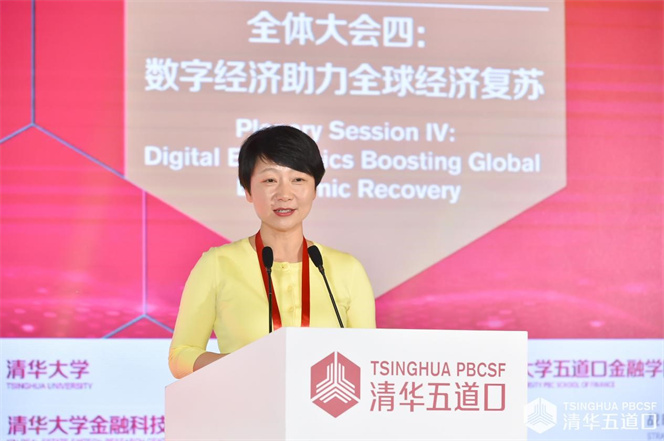
Figure. Xiaoyan Zhang
Mohit Joshi, the President from Infosys, introduced the importance of enterprise digital transformation from four aspects: the user experience, the office digital environment, the enterprise operation efficiency, and the partners. Infosys is a multinational company that provides data technology services for wealth management companies and asset management companies. Infosys aims to enhance customer experience by designing new products, especially the interactive link. Through the analysis of data to understand customers, Infosys helps customers make decisions to choose products. These customer-oriented services greatly enhance their experience and increase the accuracy of their data. At the same time, Infosys pays attention to the digitalization of the office environment. During the Pandemic, online collaboration in different office locations, creating platforms for better collaboration among employees, has changed the nature of work and changed the boundaries of the workplace. This "hybrid occupation" will become more and more popular. It can make the fastest decisions. From a technical perspective, security and privacy should also be protected during the Pandemic, and it can help digital collaboration across regions become more convenient. This new environment makes our operations more efficient.
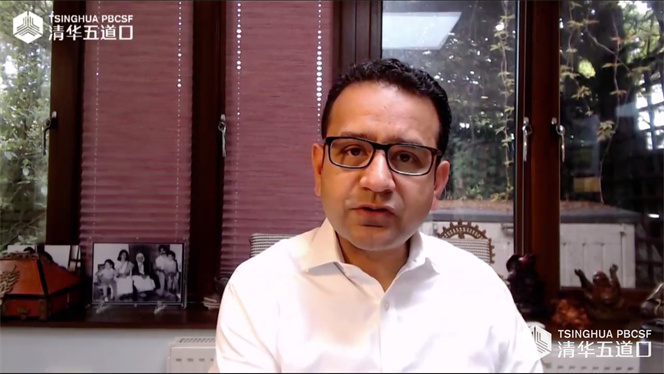
Figure. Mohit Joshi
Santiago Fernández de Lis, the Head from Regulation BBVA, delived a speech on how to realize the global digital governance. The rapid expansion of digital technology has had a profound impact on the world economy and social development. Besides the opportunities, this transformation has brought many challenges, including privacy protection, inclusiveness, and anti-discrimination. The essence of digital technology is to break the boundaries between industries and countries, requiring us to conduct more collaboration and cross-border cooperation to meet cross-border challenges. We must have enough flexibility to respond to future challenges and carry out international cooperation on areas like data supervision and data rules. The cross-border data flow, including personal data, is very popular. We need to have a minimum globalization standard to regulate the cross-border data flow. In addition, the international cooperation areas includes fair competition in the digital market, cloud computing, data security and efficiency. The government cooperation includes the participation of relevant national regulatory agencies and relevant countries, such as data protection agencies, anti-money laundering agencies, cyber security agencies, fair competition agencies, financial regulatory agencies, and central banks. The public decision-making departments, and private companies can cooperate together to discuss these important issues, and hope to continue to deepen the discussion of these issues in the framework of the global financial forum.
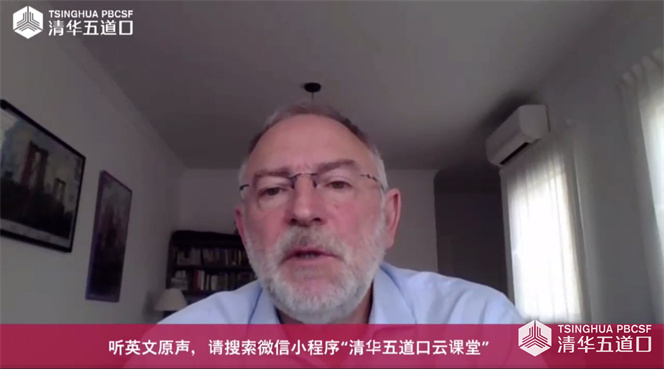
Figure. Santiago Fernández de Lis
Wei Ye, the CEO from 58 Digital Technology, delivered a speech entitled "The Cognition, Model and Social Responsibility of Digital Economy". Wei Ye expressed his views from the perspective of political economy and institutional economics. He believes that digital and technology are the two core elements of the digital economy. Data is the first means of production in the digital economy environment. There are many data platforms and scenarios. Scenes, data, and technology as a whole constitute a new production relationship and mode of production. The important core of institutional economics is rights, transactions, and contracts. In the digital economy, especially in the platform economy environment, the issue of data property rights is an issue that must be taken seriously. Compared with traditional enterprises and traditional economy, the digital economy has been greatly developed because it has greatly improved efficiency and reduced costs. But when this data platform has grown to be large enough to have a monopoly position, it creates new transaction costs. Wei Ye believes that digital technology companies must be very clear about their position in the entire economy, have a strong sense of social responsibility, contribute to the country and actively participate in the work of digital infrastructure, including the work of regulating technology. The 58 tech will serve small, medium and micro enterprises through the digital economy platform and extend their life span to make huge contribution to the national economy. At the same time, the 58 tech will focus on supporting inclusive finance, participate in academic and policy research, and contribute ideas to the country through the practice of the enterprise.
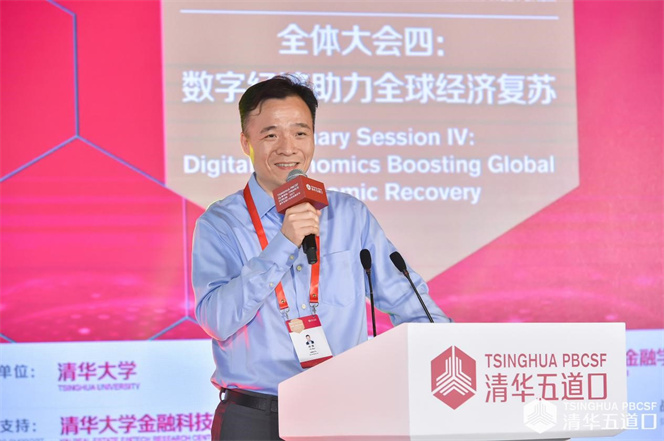
Figure. Wei Ye
In the round table discussion session, Markos Zachariadis, Professor at Greensill Chair in Financial Technology (FinTech) and Information Systems, University of Manchester, Amelia Ng, from Managing Director, SC Ventures, Standard Chartered Bank, Xin Cheng, the Secretary General of the Strategic Cooperation Center of Alibaba Research Institute, and Xin Jin, the Vice President of Baiwang Cloud, General Manager of Baiwang Financial Technology Division, deeply discussed the topics on the role of financial technology in the Pandemic and post-Pandemic era, the challenges faced by these small innovators in the digital economy, helping small and medium-sized enterprises through the digital economy, and digital technology assisting platform development.
